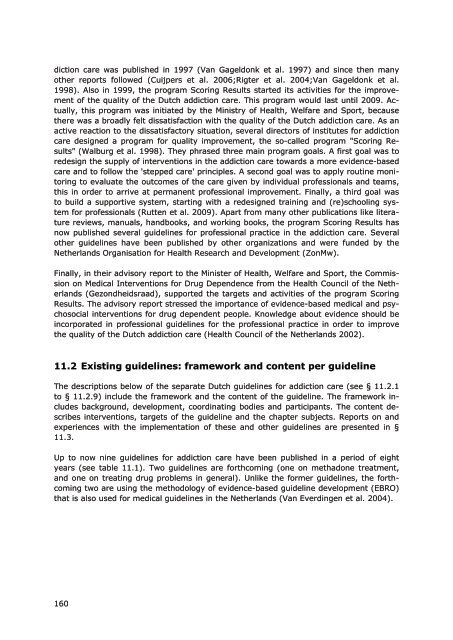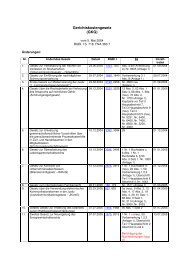The Netherlands Drug Situation 2010 - Trimbos-instituut
The Netherlands Drug Situation 2010 - Trimbos-instituut
The Netherlands Drug Situation 2010 - Trimbos-instituut
Create successful ePaper yourself
Turn your PDF publications into a flip-book with our unique Google optimized e-Paper software.
diction care was published in 1997 (Van Gageldonk et al. 1997) and since then manyother reports followed (Cuijpers et al. 2006;Rigter et al. 2004;Van Gageldonk et al.1998). Also in 1999, the program Scoring Results started its activities for the improvementof the quality of the Dutch addiction care. This program would last until 2009. Actually,this program was initiated by the Ministry of Health, Welfare and Sport, becausethere was a broadly felt dissatisfaction with the quality of the Dutch addiction care. As anactive reaction to the dissatisfactory situation, several directors of institutes for addictioncare designed a program for quality improvement, the so-called program "Scoring Results"(Walburg et al. 1998). <strong>The</strong>y phrased three main program goals. A first goal was toredesign the supply of interventions in the addiction care towards a more evidence-basedcare and to follow the 'stepped care' principles. A second goal was to apply routine monitoringto evaluate the outcomes of the care given by individual professionals and teams,this in order to arrive at permanent professional improvement. Finally, a third goal wasto build a supportive system, starting with a redesigned training and (re)schooling systemfor professionals (Rutten et al. 2009). Apart from many other publications like literaturereviews, manuals, handbooks, and working books, the program Scoring Results hasnow published several guidelines for professional practice in the addiction care. Severalother guidelines have been published by other organizations and were funded by the<strong>Netherlands</strong> Organisation for Health Research and Development (ZonMw).Finally, in their advisory report to the Minister of Health, Welfare and Sport, the Commissionon Medical Interventions for <strong>Drug</strong> Dependence from the Health Council of the <strong>Netherlands</strong>(Gezondheidsraad), supported the targets and activities of the program ScoringResults. <strong>The</strong> advisory report stressed the importance of evidence-based medical and psychosocialinterventions for drug dependent people. Knowledge about evidence should beincorporated in professional guidelines for the professional practice in order to improvethe quality of the Dutch addiction care (Health Council of the <strong>Netherlands</strong> 2002).11.2 Existing guidelines: framework and content per guideline<strong>The</strong> descriptions below of the separate Dutch guidelines for addiction care (see § 11.2.1to § 11.2.9) include the framework and the content of the guideline. <strong>The</strong> framework includesbackground, development, coordinating bodies and participants. <strong>The</strong> content describesinterventions, targets of the guideline and the chapter subjects. Reports on andexperiences with the implementation of these and other guidelines are presented in §11.3.Up to now nine guidelines for addiction care have been published in a period of eightyears (see table 11.1). Two guidelines are forthcoming (one on methadone treatment,and one on treating drug problems in general). Unlike the former guidelines, the forthcomingtwo are using the methodology of evidence-based guideline development (EBRO)that is also used for medical guidelines in the <strong>Netherlands</strong> (Van Everdingen et al. 2004).160




